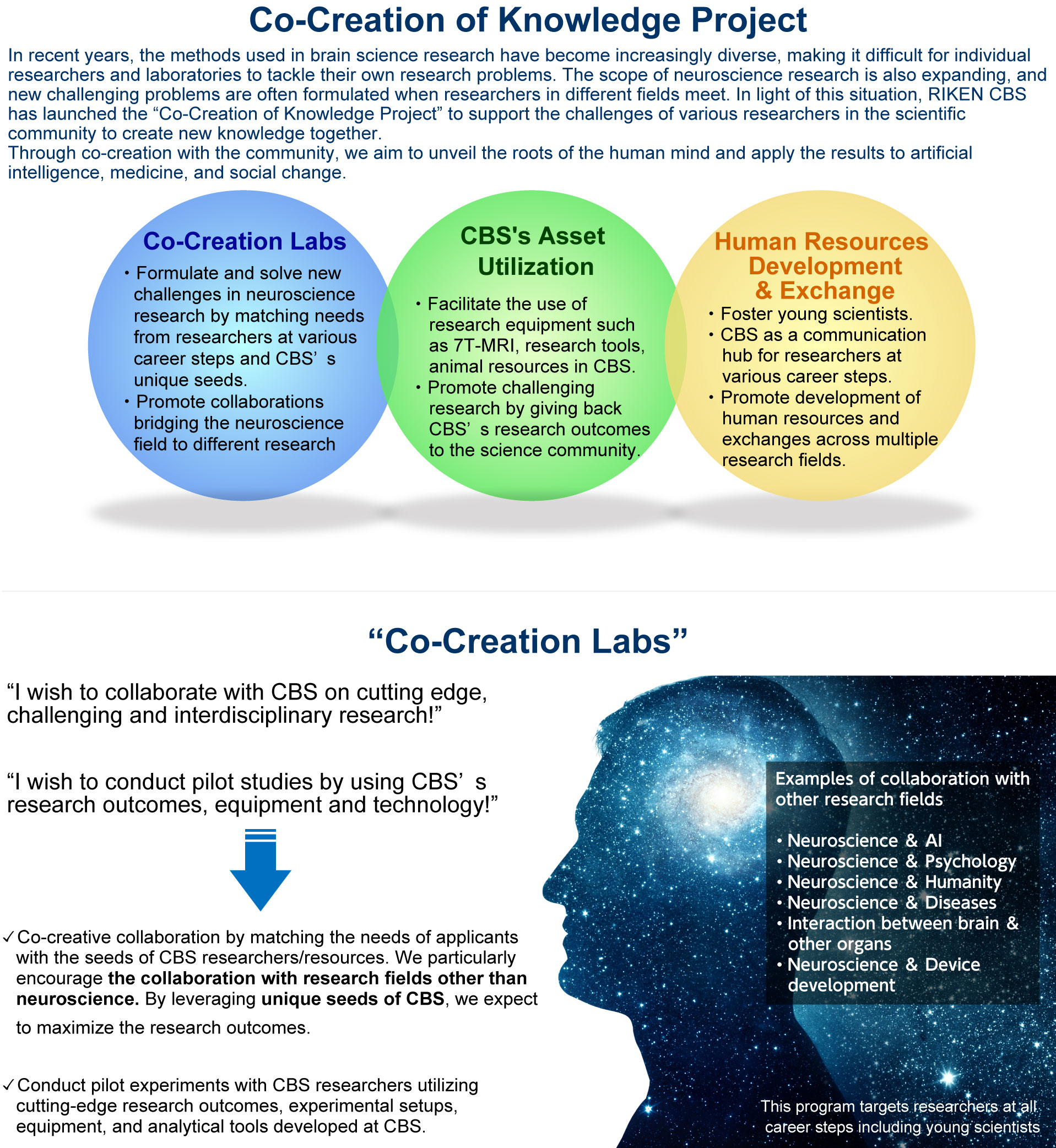
Call for proposals:
CBS Co-Creation of Knowledge Project
— Co-Creation Laboratories
Call for proposals: CBS Co-Creation of Knowledge Project
— Co-Creation Laboratories
Aug. 1, 2025
RIKEN Center for Brain Science (CBS) has been advancing the “CBS Co-Creation of Knowledge Project,” which aims to build and expand a framework for “Co-Creation” to engage in truly challenging and innovative research together with researchers from various scientific communities. As part of this project, the “Co-Creation Laboratories”—an open platform for collaborative research—was launched in the 2023 fiscal year, and currently five Co-Creation Laboratories are actively conducting their research. We are now calling for research proposals of the Co-Creation Laboratories, which will begin in the 2026 fiscal year.
What is Co-Creation Laboratory?
If you are looking for opportunities for:
- cutting-edge, challenging and interdisciplinary research in collaboration with CBS
- collaborative or pilot experiments utilizing CBS’s research results, equipment, and analysis techniques
We promote collaborative research between CBS and researchers in various scientific communities. We will match the needs from researchers outside RIKEN, including young researchers, with the seeds1 from CBS, and adopt challenging research proposals in the form of an open call. In particular, we welcome collaborative research between brain science and other fields2or innovative co-creative research utilizing CBS’s unique experimental equipment, resources, and analysis tools. The Co-Creation Laboratory Fund will be allocated to the selected projects as follows.
1 Examples of the seeds at CBS: 7 Tesla MRI; 3 Tesla MRI; ultra-wide field of view two-photon microscope FASHIO-2PM; TissueCyte; electron microscope; mouse behavioral analysis battery; experimental animal resources; experiment equipment, analysis techniques, databases, and analysis tools originated by CBS; etc. For resources and tools provided by the CBS Research Resources Division (RRD), please refer to the brochure of CBS Research Resources Division (RRD).
2 Examples of collaborative research between brain science and other fields: Brain science and AI, brain science and psychology, brain science and humanities, brain science and human diseases, brain and multi-organ connections, brain science and device development, etc.

Research Proposals Selected for Co-Creation Laboratories FY2025-2027
Roles of ER-Mitochondria Contacts in Growth Cone Regulation
during Neural Development
Yusuke Hirabayashi
Associate Professor
Department of Chemistry and Biotechnology, School of Engineering, The University of Tokyo
and
Hiroyuki Kamiguchi
Team Leader
Laboratory for Neural Cell Dynamics, CBS
(Research period: FY 2025 to 2027)
Research Proposals Selected for Co-Creation Laboratories FY2024-2026
Cross-species identification of brain systems
for emotion-state and trait modulation of decision making
Ai Koizumi
Researcher
Sony Computer Science
Laboratories, Inc.
and
Joshua Johansen
Team Leader
Laboratory for Neural Circuitry of Learning and Memory, CBS
(Research period: FY 2024 to 2026)
Investigation of spinal sensory representation mechanisms
using a large-scale imaging technique
Keisuke Koga
Assistant Professor
Department of Neurophysiology
Hyogo Medical University
and
Masanori Murayama
Team Leader
Laboratory for Haptic Perception and Cognitive Physiology, CBS
(Research period: FY 2024 to 2026)
Research Proposals Selected for Co-Creation Laboratories FY2023-2025
Contribution of Rehabilitation and Sleep to Functional Recovery in Stroke Patients
Michiyuki Kawakami
Associate Professor
Department of Rehabilitation Medicine
Keio University School of Medicine
and
Masako Tamaki
Team Leader
Cognitive Somnology RIKEN Hakubi Research Team, CBS
(Research period: FY 2023 to 2025)
Analysis of Neural Network Structure Using Large-Scale Neural Activity Recordings by Labeling and Manipulating Individual Neuron Genetic Codes
Takeshi Yagi
Professor
Graduate School of Frontier Biosciences, Osaka University
and
Masanori Murayama
Team Leader
Laboratory for Haptic Perception and Cognitive Physiology, CBS
(Research period: FY 2023 to 2025)



